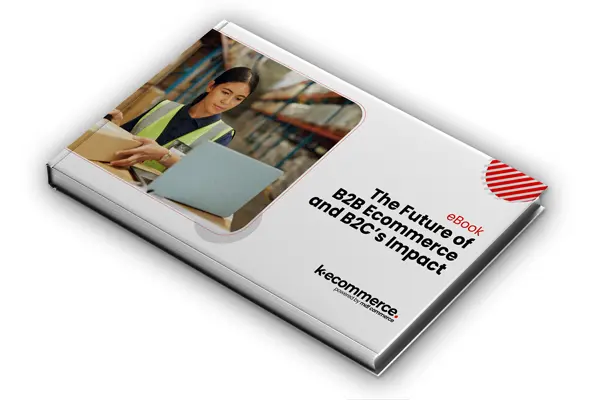
See how B2B trends and buyer needs shape your future in our new eBook.
Create an efficient and secure way to do business
Shorten the sales cycle and benefit from better margins
Personalize your clients shopping experience
Create an efficient and secure way to do business
Shorten the sales cycle and benefit from better margins
Personalize your clients shopping experience

Transform your buyers into loyal advocates with one-of-a-kind ecommerce experiences —tailored to their role, preferences, and payment and contract terms— on every transaction.

The personalization at scale that B2B buyers expect and demand requires leveraging customer data and tailoring your messaging and offerings for specific segments of your B2B audience. In B2B, getting it right is not always straightforward.
While B2C personalization often targets single consumers making single purchases, sometimes based on impulse, B2B ecommerce personalization has to take into account all the complexities and factors that make B2B purchasing unique:
To meet unique pain points and needs, B2B companies must have the personalization capabilities to offer tailored products and services for each customer. And today’s investments in personalization show that businesses are making it a top priority.
According to data from Adobe, 63% of B2B ecommerce companies are investing in improving their customer experience by adding new personalization features, but 40% of small companies admit that personalization will be a major challenge for them.

Only 68% of B2B businesses are using behavioral and transactional data collected from their ecommerce storefronts to drive personalization across their website.
62% of B2B businesses feel they need to upgrade or replatform their current ecommerce infrastructure to provide buyers a more seamless, personalized purchase journey.
Companies are about 50/50 on whether they have a documented personalization strategy in place. As many as 49% either don’t have one at all or are still working on establishing one.
55% of B2B organizations are actively educating themselves about personalization opportunities, including how to leverage existing tools and technologies to power it.
Personalization should be an essential component of your B2B company’s commerce strategy, regardless of whether you want to launch a transactional ecommerce site, or simply start with an online B2B customer portal. If you’re new to online sellling and service, and a complete B2B ecommerce project seems like too big an undertaking, a self-service portal for digitally-inclined customers is an easy solution you can get up and running quickly.
A B2B portal, most often, gives your buyers (and your sales and service reps) a simple way to access, view, and manage:
A B2B portal streamlines bulk ordering, tailors pricing and payment terms, simplifies re-ordering, and offers a specialized product catalog for an enhanced user experience. And it means you can empower your buyers to handle some or all of the purchase process on their own, while providing your teams a way to offer fast support as needed.


With a self-service portal, you can create a comprehensive knowledge base with FAQs, tutorials, and product guides tailored for your B2B clients. This allows them to find answers to their questions so they can make informed decisions about their purchases without reaching out to the support team. Customers can also manage their accounts, update personal details, and more.
They also help ensure:

By offering a personalized B2B ecommerce experience, you make it easier for customers to complete tasks in your store. As a result, buyers can spend less time on activities like finding the right products, adding items to the cart, adding payment information, and choosing shipping options. This, in turn, keeps them coming back to do business with you.
But the benefits of personalization in B2B ecommerce stretch even further, especially with a platform like k-ecommerce in your business toolkit.
When you choose k-ecommerce as your B2B ecommerce solution, you guarantee:


With k-ecommerce, personalizing B2B experiences in the way modern buyers demand means a simplified procurement process, increased sales, improved customer loyalty, and happier buyers.
Looking for a B2B ecommerce solution that comes with several personalization options, including a self-service portal, customer-specific pricing and payment options, access restrictions, and integration with ERP systems for data sharing?
Many B2B customers consider their suppliers (that’s you!) a regular part of their business operations. They rely on you to keep business as usual moving seamlessly, and are likely to order the same products in similar quantities at regular intervals.
These circumstances make it absolutely essential that B2B vendors optimize B2B ecommerce experiences for:
Based on their order history, you can offer customers the option to reorder products based on a previous purchase without having to navigate the store and select each item individually. This lets them skip the other parts of the buying process and jump straight to checkout, saving them valuable time.
Because suppliers typically have different price agreements with each customer based on a number of factors, like order quantities, company size, and the duration of the relationship, you need to replicate these terms when setting up your B2B ecommerce website. The result? Customers always get the pricing they expect, and never have to contact customer support about inaccurate costs.
You can use a customer’s browsing history and past order data to make recommendations, either for improved versions of products they have previously ordered or for related products that complement what they have. For you? A huge cross-selling opportunity. For your buyer? Personalized recommendations and discounts on bulk or volume orders.
B2B clients know exactly what they’re looking for. It’s your responsibility, then, to offer a functional shopping experience where they spend less time browsing the store. A custom catalog and custom search results will make sure you only show products that align with the customer’s interests, needs, and requirements.
The B2B organizations that do personalization best lean on customer segments to offer tailored content across marketing channels, increasing engagement and, by extension, your business’s bottom line.
B2B ecommerce focuses on hyper-specific personalization, relationship-building, and addressing complex business needs — in addition to convenience and speed.
That’s why B2B ecommerce platforms often incorporate advanced functionality to tackle the complexities of B2B transactions. Think: customer-specific pricing, real-time inventory tracking, customized payment arrangements, catalog management, and robust checkout processes.

Made-for-B2B capabilities like these not only help make sure your business maintains strong, lasting relationships with your valued customers, but also can improve your competitive positioning. Most B2B organizations that have invested in tools to drive B2B ecommerce personalization capabilities also saw growth in market share as a result.

B2B ecommerce personalization needs customer data to work correctly, and this data comes from their interactions with your brand.
But using this data for B2B personalization done right starts with a complete view of your customers. Because buyers don’t interact or purchase in channel siloes, and you shouldn’t personalize that way either. Still, a complete customer view needs a centralized source of truth.
For companies just getting started with an ecommerce store, ERP systems are a great source of historical customer data. B2B companies can use an ERP-integrated ecommerce solution to provide personalized experiences for long-time customers based on this data.
And those doing so are seeing a major payoff.
More than 70% of organizations improved their customer experiences and productivity through ERP implementation. Layering on an integrated ecommerce solution gives you another way to boost your return on that investment, and a simple way to use the data in your ERP to drive business value through B2B ecommerce growth and engagement opportunities.
To get the most out of your ERP integration, choose a platform like k-ecommerce: a cloud-based platform designed to meet the requirements of B2B online businesses by directly integrating with ERP systems like Acumatica, Microsoft Dynamics ERPs, and SAP Business One (without using third-party connectors).
With k-ecommerce, you can scale your B2B operations with confidence: never having to sacrifice your margins, your ways of working, or your performance. (That’s true even if you’re switching or between ERP systems.)
That’s the k-ecommerce promise.

"We didn’t want the typical web store layout. We wanted more of a product listing, with standard order quantities and customer-specific pricing, where they could quickly key in and submit their order."
David Harris
President, John R. White
